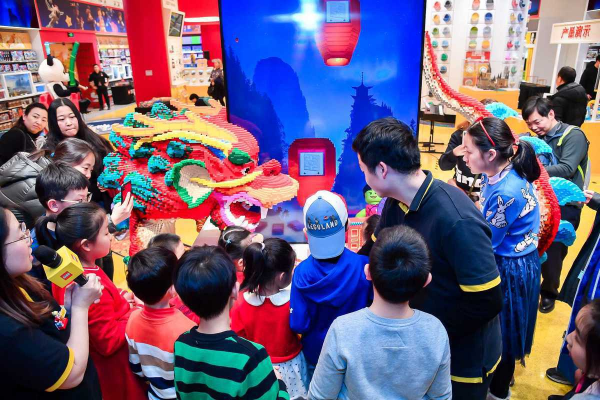Lego Group shows strong, double-digit growth in China

The world's leading toy maker, Lego Group, posted 6 percent revenue growth year-on-year globally, and strong double-digit growth in China, with plans to open more than half its global new stores this year in the country.
According to Lego's reported earnings for the full year ending December 2019, in 2020, the group plans to open an additional 80 stores in about 20 new cities in China. This year Lego plans to open about 150 more stores worldwide, with the majority on the Chinese mainland.
Despite single-digit growth in the Americas and Western Europe, the Chinese market grew strong in double-digits, according to Lego.
Lego expanded its presence in tier three and four cities in China, with 140 retail stores in 35 cities by the end of 2019, including flagship stores in Beijing and Shanghai.
In a conference call on Wednesday, The Lego Group CEO, Niels B. Christiansen, said the company is continuing to invest significantly in China.
"We try to go from 140 up to 220 stores by the end of 2020 covering and more than 50 cities in China," said Christiansen.
Paul Huang, senior vice-president of the Lego Group and general manager of Lego China, said Lego is going to open more stores in developed markets in Eastern China, as well as in some capital cities in China's western provinces and some lower tier cities to have readily good coverage of the country's geography.
For example, in Yunnan province in Southwest China, Lego is expected to open its first Lego certified store in Kunming in May. New certified stores in Guiyang of Guizhou province in Southwest China and Lanzhou in Gansu province in Northwest China are on the agenda within this year.
"They (these cities) are quite important and not actually that small," Huangsaid.
He said even for some stores in lower tier cities, they're performing stronger than some stores in tier-one city demonstrating the great potential of the Chinese market across many geographic places.
On the impact of the novel coronavirus outbreak, Christiansen said so far their main focus has been on the safety and well-being of all their employees globally, and complying with all governments' guidelines and regulations.
"Despite uncertainty for the shorter term, the outbreak of virus doesn't change our long-term strategy of opening more stores in parallel with building online access," the CEO said.
Lego also developed its e-commerce presence on partner platforms, including JD.com and Tmall, and recently renewed its partnership with Tencent as part of plans to engage consumers and shoppers through digital experiences.
Last year, Lego opened 150 Lego branded stores globally and now has 570 stores around the world.
Globally, Lego grew 6 percent in terms of revenue to DKK 38.5 billion ($5.7 billion), compared with 2018. Consumer sales grew 5.6 percent and overall global market share increased. Its net profit grew 3 percent to DKK 8.3 billion.
"It was a strong year where we outperformed the toy industry and grew consumer sales and market share in all our largest markets," Christiansen said.
He said the industry is being redrawn by digitalization and global socio-economic shifts. The company has invested in the long-term, including innovating play, innovating the retail ecosystem and investing in new market entries.
Invest in China Copyright © 2025 China Daily All rights Reserved
京ICP备13028878号-6
 京公网安备 11010502032503号
京公网安备 11010502032503号





